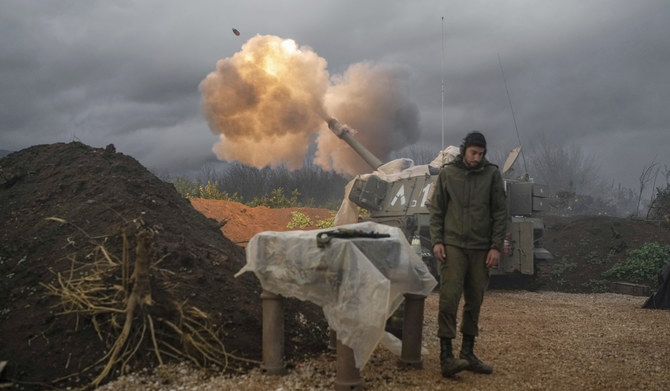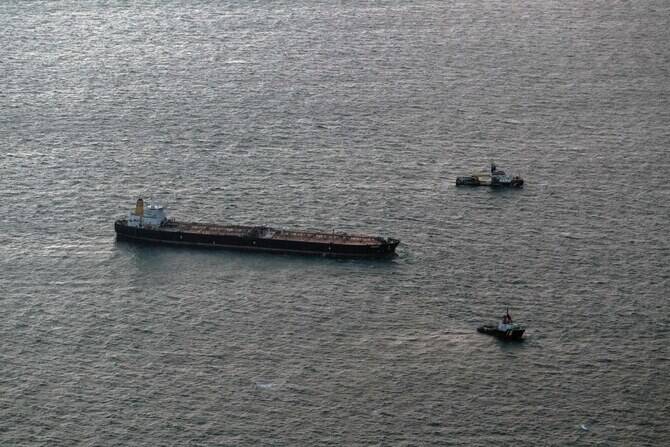BEIRUT/PARIS: France has delivered a written proposal to Beirut aimed at ending hostilities with Israel and settling the disputed Lebanon-Israel frontier, according to a document seen by Reuters that calls for fighters including Hezbollah’s elite unit to withdraw 10 km (6 miles) from the border.
The plan aims to end fighting between the Iran-backed Hezbollah and Israel at the border. The hostilities have run in parallel to the Gaza war and are fueling concern of a ruinous, all-out confrontation.
The document, the first written proposal brought to Beirut during weeks of Western mediation, was delivered to top Lebanese state officials including Prime Minister Najib Mikati by French Foreign Minister Stephane Sejourne last week, four senior Lebanese and three French officials said.
It declares the aim of preventing a conflict “that risks spiraling out of control” and enforcing “a potential ceasefire, when the conditions are right” and ultimately envisions negotiations on delineation of the contentious land border between Lebanon and Israel.
Hezbollah rejects formally negotiating a de-escalation until the war in Gaza ends, a position reiterated by a Hezbollah politician in response to questions for this story.
While some details of similar mediation efforts by US Middle East envoy Amos Hochstein have been circulating in recent weeks, the full details of the French written proposal delivered to Lebanon have not previously been reported.
The three-step plan envisages a 10-day process of de-escalation ending with the border negotiations.
One French diplomatic source said the proposal had been put to the governments of Israel, Lebanon and Hezbollah.
France has historical ties with Lebanon. It has 20,000 citizens in the country and some 800 troops as part of a UN peacekeeping force.
“We made proposals. We are in contact with the Americans and it’s important that we bring together all initiatives and build peace,” Sejourne told a news conference on Monday.
The plan proposes Lebanese armed groups and Israel would cease military operations against each other, including Israeli airstrikes in Lebanon.
Several non-state groups, including Palestinian factions, have mounted attacks on Israel from south Lebanon during the latest hostilities, though Hezbollah is the dominant power in the area with a fighting force widely seen to outgun the Lebanese army.
The Lebanese armed groups would dismantle all premises and facilities close to the frontier, and withdraw combat forces — including Hezbollah’s elite Radwan fighters and military capabilities such as antitank systems — at least 10 km north of the frontier, the document proposes.
Any such withdrawal could still leave Hezbollah fighters much closer to the border than the 30 km (19 mile) withdrawal to Lebanon’s Litani River, stipulated in a UN resolution that ended a war with Israel in 2006.
The shorter withdrawal would help ensure rockets did not reach villages in northern Israel that have been targeted with anti-tank missiles and was a compromise seen as more palatable to Hezbollah than a retreat to the Litani, one Western diplomat with knowledge of the two-page proposal said.
Up to 15,000 Lebanese army troops would be deployed in the border region of south Lebanon, a Hezbollah political stronghold where the group’s fighters have long melted into society at times of calm.
Asked about the proposal, senior Hezbollah politician Hassan Fadlallah told Reuters that the group would not discuss “any matter related to the situation in the south before the halt of the aggression on Gaza.”
“The enemy is not in the position to impose conditions,” added Fadlallah, declining to comment on details of the proposal or whether Hezbollah had received it.
One of the Lebanese officials said the document brings together ideas discussed in contacts with Western envoys and had been passed on to Hezbollah. French officials told the Lebanese it was not a final paper, after Beirut raised objections to parts of it, the Lebanese official said.
An Israeli official said such a proposal had been received and was being discussed by the government.
Reuters reported last month that Hezbollah had rebuffed ideas suggested by Hochstein, who has been at the heart of the efforts, but that it had also kept the door ajar to diplomacy.
Asked for comment for this story, a State Department spokesperson said the United States “continues to explore all diplomatic options with our Israeli and Lebanese counterparts to restore calm and avoid escalation.” The White House did not immediately respond to a request for comment.
The Lebanese official said several elements prompted concern in Beirut, including the demand armed groups dismantle premises and facilities close to the border, which the official said was vaguely worded and could be used to demand moves against Hezbollah-affiliated civilian institutions.
’UNCLEAR’ ELEMENTS
Tens of thousands of people have fled homes on both sides of the border since the fighting began on Oct. 8.
Israeli strikes have killed nearly 200 people in Lebanon, 170 of them Hezbollah fighters. Attacks from Lebanon have killed 10 soldiers and five civilians in Israel.
But the strikes have mostly been contained to areas near the border and both sides have said they want to avoid all-out war.
Numerous Western envoys have visited Beirut to discuss ways to de-escalate the fighting, mostly meeting with Lebanese state officials rather than Hezbollah, which is designated a terrorist organization by the United States.
One of the Lebanese officials said a French technical delegation returned to Beirut two days after Sejourne’s visit to discuss details, following the Lebanese objections.
Another of the Lebanese officials said Beirut had not responded to the proposal, adding that it was neither signed nor dated and was therefore not deemed official enough to warrant a response.
THREE-STEP APPROACH
The proposal recalls a ceasefire which ended a war between Hezbollah and Israel in 1996, and also UN Security Council resolution 1701 that ended the 2006 war.
It maps out three steps over 10 days.
The two sides would cease military operations in step one. Within three days, step two would see Lebanese armed groups withdrawing combat forces at least 10 km north of the frontier and Lebanon would initiate the deployment of soldiers in the south. Israel would cease overflights into Lebanese territory.
As the third step, within 10 days, Lebanon and Israel would resume negotiations on delimiting the land border “in a gradual way” and with the support of the UN peacekeeping force UNIFIL.
They would also engage in negotiations on a roadmap to ensure the establishment of an area free of any non-state armed groups between the border and the Litani river.
Hezbollah has previously signalled it could support the state negotiating a deal with Israel to settle the status of disputed areas at the border to Lebanon’s benefit.
One of the issues to address is financing for the Lebanese army, severely weakened by a severe financial crisis in Lebanon.
The proposal calls for an international effort to support the deployment of the Lebanese army with “financing, equipment, training.” It also called for “the socio-economic development of southern Lebanon.”


























